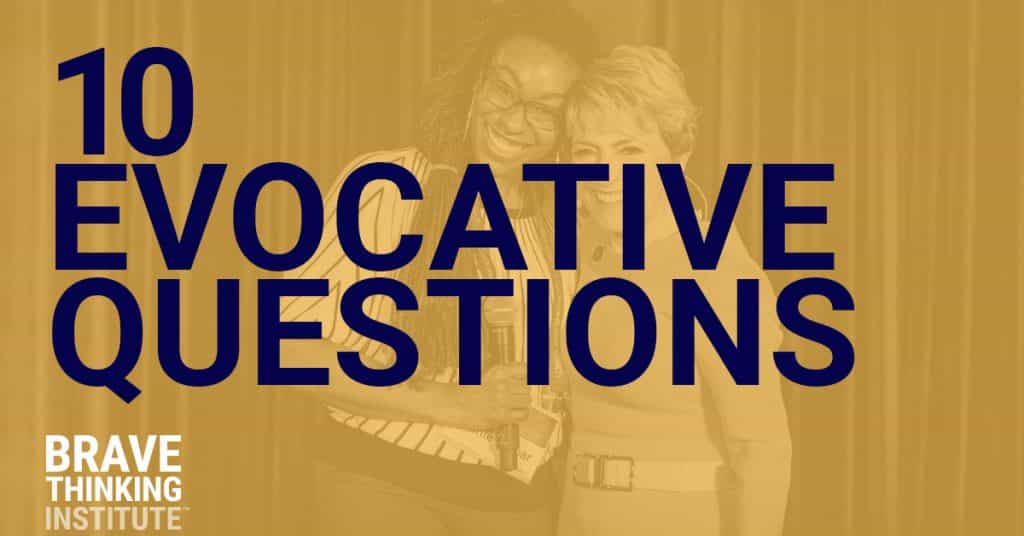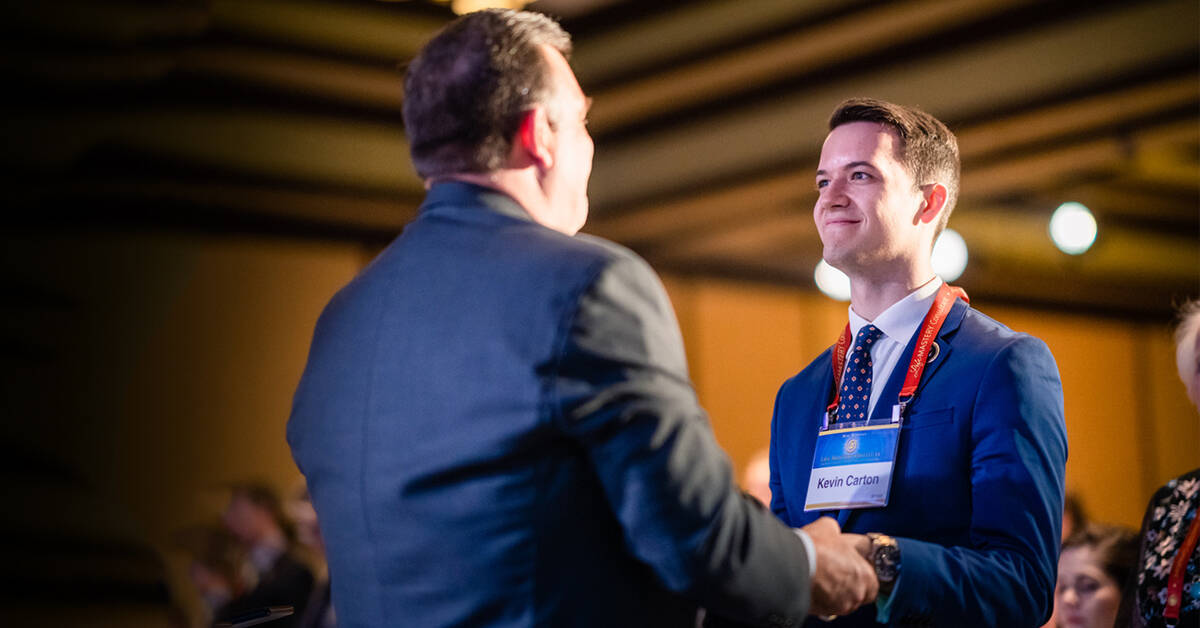Here Are 10 Evocative Questions You Can Ask Your Clients That Will Help Them Generate The Answers They Seek, And Move Toward Their Goals And Dreams
As a life coach, above all else, your job is to support your clients in transforming their dreams into reality.
Some clients will come to you with a crystal clear idea of what they’d love to create for themselves.
They may want to attract their soulmate or change professions, for example. Other clients may not be totally clear on their goals and dreams.
They may something like,
“I’m not sure what I want to create in my life, I just know that I want to have more fun and feel a greater sense of aliveness and fulfillment.”
At Brave Thinking Institute, we firmly believe that whether a client knows exactly what they want, or they don’t, the most powerful way that you can support them is through evocative coaching.

What is Evocative Coaching?
Evocative coaching is a form of heart-centered life coaching that supports your client in understanding that all of the answers they seek to move their life forward are within themselves.
The life coach’s role then, is to assist the client in connecting with and listening to their own inner wisdom as the basis of taking action toward their goals and dreams.
As a coach, you assist your clients in becoming the architects of their own life.
Evocative coaching is based on the idea that within each one of us, we have all of the answers that we seek.
This philosophy of encouraging clients to look within for the answers they seek is actually the basis of evocative coaching, a form of coaching that is highly effective for helping clients create the results they desire in life.
So rather than telling your clients what to do, evocative coaching is designed to help them look within and bring forth the answers that will move them toward a life they truly love living.
3 Evocative Coaching Methods

As heart-centered life coaches, we know that there is a power within all of us that’s far greater than any circumstance, situation or condition – and we aim to guide our clients in harnessing this power to create a life they truly love living.
Perhaps you’re already aware of evocative coaching methods, and maybe you’re already using them with your coaching clients without even realizing it!
Either way, it’s beneficial for all life coaches to have an understanding of evocative coaching principles, and how they can positively impact your clients’ results.
The following are 3 evocative coaching strategies you can use with your clients to help them find their own answers and move toward their dreams.
1. Provide your clients with techniques for being present
The number one most important step in evocative coaching is to help your clients begin to recognize and tap into the power within themselves.
One of the best ways to do this is to encourage them to live in the moment as much as possible.
Being present means living fully in the moment, without focusing on the past or future.
And in being present, we can really tap into and listen to the wisdom that’s within ourselves, which is the source from which all change begins.

One technique you can use to encourage your clients to be more present in the moment is to ask them to pause and notice what they are noticing. In any given moment, what are they thinking or feeling?
All thoughts are either expansive or contractive, and when we we tune in and notice our thoughts, we always have the power to change them if we feel they’re not serving us.
Changing our mindset is the very first step to changing our lives.
So encourage your clients to replace contractive, negative thoughts with expansive, positive, grateful ones when they find their inner voice speaking from a place or criticism, fear or doubt.
Remember to remind your clients that in order to achieve any dream, our energy must be a vibrational match to the results we desire, and the first step to doing this adopting a consistently expansive mindset.
2. Assist clients in developing the faculty of their imagination
“Condition-based thinking” is the mindset that external conditions and factors beyond our control determine what happens (or doesn’t happen) in our life.
While of course some external factors influence our life, the challenge with condition-based thinking is that is assigns total power to these conditions over our lives, and removes our own agency.
“Brave thinking,” on the other hand, is the mindset that all things are possible that can be visualized first. Basically, if you can dream it, you can do it!
You don’t ignore reality or outside challenges, you just say, “Where there’s a vision and a will, there’s a way.”
So to help your clients move from condition-based thinking to brave thinking, you can encourage them to develop their imagination, which is one of our six mental faculties (imagination, intuition, will, reason, memory, perception), and an absolute superpower when used correctly.
Everything in existence was created twice – once in someone’s imagination, and then in the physical world.
So the first step to creating results is to use our imagination to create vivid pictures of what we’d love our lives to look like, and then to “step inside this vision” and try on what it would feel like.
I do an activity at my three-day signature event, DreamBuilder LIVE, called “time machine” that involves mentally stepping into a time machine and then telling a partner all about your life three years from now in the present tense.
You can do this activity with your coaching clients and encourage them to notice how empowering it feels to be “living” their dream life!
3. Ask your clients the right questions
Evocative life coaching does not involve giving advice or directives, but rather leading clients on an inward journey to find the answers themselves. To do this involves asking clients the right questions ‒ and encouraging them to ask themselves the right questions – to think expansively.
When prompted to identify and focus on the gift in any scenario, your clients will naturally think more expansively and will begin to see opportunities to take where they previously saw roadblocks.

10 Powerful Evocative Coaching Questions
Here are 10 evocative coaching questions you can ask your coaching clients to help them connect with their inner guidance system, so that they can move themselves forward in life.
1. Where are you experiencing longing in your life?
Your client may not actually know the answer to this question right away. But as you chat, they may begin saying things like, “It would be great if…” or “I’d love it if…” and a longing of theirs shows through that you can help them elaborate on.
Make your client aware that this feeling of longing is actually the life force within them seeking to expand and express itself more fully.
2. Where are you experiencing “divine discontent?”
Discontent shows up through statements like, “Oh, I’m so tired of struggling with money,” or “I’m so tired of getting into bed alone each night.”
The reason I call this divine discontent is because these sentiments are really just life speaking to us, saying, “You were meant for more. Don’t settle for a life that’s not what you really want!”
3. What activities do you do where you feel like you just go “into the zone,” and you totally lose track of time?
Ask your client to recall when they have felt most alive. What were they doing? Pinpointing these activities is a great way to shine a light on the dreams that are seeking to emerge for them.

4. What types of things do other people compliment you for?
Your client may initially answer by saying “Hmmmm I don’t know,” because it can feel humbling or awkward to look at themselves in a celebratory way.
So encourage your client to start paying attention to the praise and positive feedback they get from people.
What’s the theme of it?
What might it say about what they’re good at?
Or what they are truly called to do?
5. What would you do if you had unlimited resources?
Like question #4, many clients say that they’ve never really allowed themselves to ask this question.
So if they start to protest or blank, just encourage them to entertain the question.
It can be very telling about what someone is truly called to when they stop limiting possibilities on account of time and money.
6. What would you try now if you knew you could not fail?
This is a really powerful example of what I call a “dream door opener.” Encourage your client to actually answer the question by stating,
“If I knew that I could not fail I would ___________.”
They may surprise themselves with the ideas that spring forth!
7. Who is someone that you know, or that you’ve heard of or read about, that you really admire?
There’s tons of amazing personal development blogs out there. Ask your client the questions and let them answer it, and then say,
“What are the specific traits? What are the three things you admire about them?”
When they list off the traits of the person they admire, you can say to your client,
“Do you know something? You can’t admire traits in someone else that you don’t have inside of you, because otherwise you wouldn’t have noticed them! So there’s some part of you that is already like this and as you admire these traits, feel better about yourself, because you have them in you too.”
8. If you knew that this was your last year on the planet, what would you start doing you haven’t been doing? What would you stop doing that you are currently doing?
This is an incredibly powerful question that will immediately help your client discern between what’s really important to them and what really matters, and what’s more peripheral.
9. If you did know the answer, what would it be?
This is a great question for getting a client who feels stuck unstuck. If a client says, “I don’t know,” to any question you ask, you can gently say,
“Okay, but if you did know the answer, what would it be?”
This question is helpful because deep down, we all do know the answers to these questions.
When we allow our minds to move into confusion, we block ourselves knowing what we really know inside of us.
10. What am I not asking you that you really want me to ask?
Another way to phrase this question to your client is,
“What am I not asking you that deep down, you know that if I did ask you, it could really help you?”
By asking this question, you invite your client to share how they would most love to be guided and supported by you.
Evocative coaching helps your client become the architect of their own life
Over the course of your coaching relationship, you can use evocative coaching to help move your client forward and stay on track to their goals. You can ask your client several of the questions I’ve shared with you here, or laser in on one or two questions that really get at the heart of what they want to transform in their life.
And remember, your clients already have the answers they seek within them.
It’s your job as a life coach to help them tap into that inner wisdom and take action to create lives they love living.
By putting the power into their own hands, you’re giving your client the gift of knowing that they’re in control of their lives – and that there’s a power within them that’s far greater than any circumstance, situation or condition.

Practicing hard coaching questions in your own life
The very best thing you can do to be an effective evocative life coach is to live by these principles yourself!
As coaches, if we don’t incorporate these evocative life coaching principles into our own lives, we will fall flat when trying to apply them in our life coaching sessions.
I suggest that every morning, to prepare for seeing clients, you also practice being present and then ask yourself a series of questions or creating a series of visions for how you would love your day to go.
This will automatically put you in an expansive mindset that you can bring to and model for your clients!

This is What Happens When Life Coaches Practice What They Preach
As humans, we naturally want more joy and freedom in our lives. Being a life coach gives you the income and flexibility to design your life the way you want it to be.
However, as we discussed above, the evocative model of life coaching isn’t simply a situation in which a wise, all-knowing guru dispenses sage advice to his or her enthralled listeners, remaining unchanged through the whole process.
It’s a journey you take together, and every time you interact with a client, both of you grow. So what do life coaches learn on the journey?
You’ll learn to listen
As you converse with your clients about their challenges, hopes and dreams, your listening skills will improve, enabling you to have better relationships with everyone in your life.
You’ll learn to be who you truly are
You’ll learn how to share your own story and experiences with your clients, thus showing them that they aren’t alone and that you understand what they’re going through.
And as you practice this vulnerability in revealing your past, you will learn to be more comfortable with your own imperfections, and your clients’ acceptance of you and your wounds will help you shed your mask of perfection, so you can live confidently as the person you truly are.

You’ll learn how to understand and influence people
As you have conversations with your clients, discover what they want, and respond with evocative questions and comments that guide them toward the changes they long to make, you’ll learn both how to get to the core of what people truly desire, and how to gently influence them to make lasting changes in their lives.
Every time your client has a breakthrough or an a-ha moment, and they share their thoughts and experiences with you, it gives you an opportunity to learn more about how to help people create the life of their dreams, and you’ll have more knowledge with which to improve the lives of both your future clients and yourself.
It’s about helping your clients, but it also helps you
What you learn in the process of coaching your clients helps you grow as a person, and enables you, through your own growth, to have a bigger, more positive impact on every person who comes into contact with you.
For even more strategies and ways to grow you influence and income as a heart-centered life coach, register now for this upcoming masterclass:





Leave a Reply